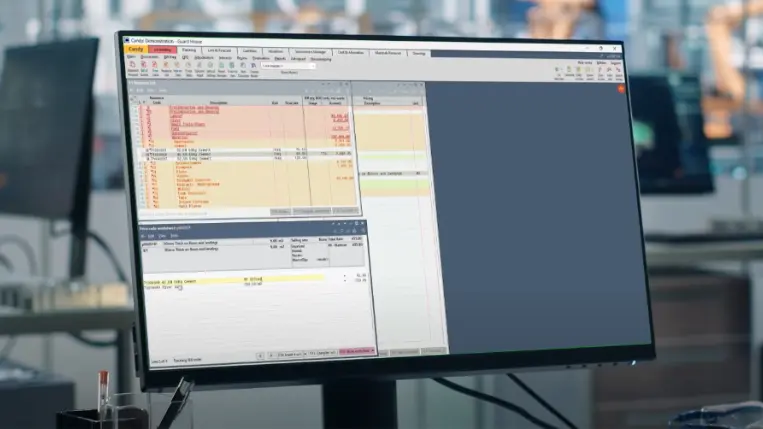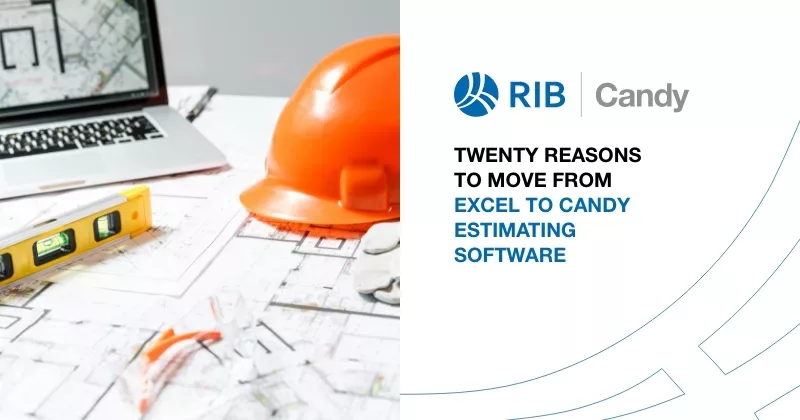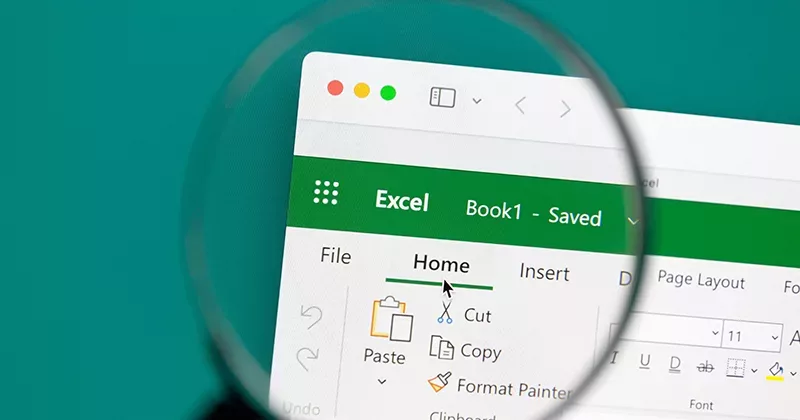11 mins read
Spreadsheets vs Construction Estimating Software: Which One Is Better?

There’s something comforting about using tools you’re accustomed to. This gets the job done, so why “change it? “is an often-heard refrain. However, as your circumstances change, so should your equipment. Excel has long been the accepted standard for construction cost estimation, and with its broad availability and ease of use, it’s easy to see why. But with the emergence of bespoke estimation software, could it be time to reconsider what works best for you?
As an experienced construction estimator, the decision to move away from the ‘old school’ use of spreadsheets to bespoke software is one you have probably asked yourself many times over. In an industry historically reluctant to change, it is no surprise that many professionals feel skeptical about transitioning to more innovative solutions. However, with the proper knowledge and support, change can seem a lot less scary. So, spreadsheets vs construction estimating software – which one is better?
It’s the battle of construction management tools. In this insightful article, we’ll explore the benefits and challenges of each tool and explain why specialized software is the winning choice in today’s context. Let’s dive in!
Construction Estimating Using Excel: the Name You Know
Excel has been part of the construction industry for more than 40 years. Although it was not developed especially for our industry, it quickly became one of the most used solutions in the preconstruction planning stage, digitalizing many processes previously done with pen and paper.
Excel’s popularity grew exponentially in the building industry in the years after its release, mainly because the software was affordable, customizable, and had a relatively small learning curve that made it easier for any project stakeholder to understand and use.
However, the world never stopped evolving, and the cracks in Excel’s usability started to show sooner rather than later. As competition grew harder in the construction industry, companies began to require smarter and more innovative solutions that presented an advantage over their counterparts. The difficulty of sharing data and essential information in a multi-office environment and the multitude of outdated spreadsheets moving from one computer to another made using Excel for construction estimating a less suitable choice.
In 2024, Excel is still the choice for many companies in the building sector. After all, the software is ubiquitous and user-friendly, and with a bit of googling, there’s usually a template for the job at hand. However, it still has many limitations.
Updating templates can be laborious, often requiring you to do so on a file-by-file basis. With a limited number tailored explicitly for the construction industry, these often must be adapted for use. Added to this, Excel doesn’t share information easily or automatically.
Even though some estimators may enjoy using Excel to create tools that suit their needs, standardization is a cornerstone of working on group projects or as part of a larger firm. And since Excel wasn’t designed with the built environment in mind, technical support can be challenging to come by.
Specialized Construction Estimating Software: the Next Step
Specialized construction estimating software was developed to address the many challenges estimators faced as the world became increasingly digitally driven. These solutions offer industry-specific features that make construction takeoffs and estimating easier and more accurate while giving the capacity to share data in real-time in an online environment.
That said, it would be unfair to say that modern estimating software comes without challenges. Potentially higher costs and the time required to learn a new system often scare companies from implementing such solutions. However, the advantages are obvious. Since cloud-based software is accessible from anywhere, it provides optimum control over the information you share. The data is also available immediately, solving cross-department communication, report sending, and standardization issues.
Blueprints can be added and viewed as 3D models, allowing material takeoff where the materials needed to build a structure are quantified to be tracked in real-time. The chance of human error resulting from individual formulas and templates is also eliminated, with the possibility of dangerous discrepancies further down the line. Onboard analytics and reporting also offer true oversight of your team’s effectiveness, allowing you to optimize their skills for maximum profits.
Should you encounter a technical problem, the latest generation of estimation software is made by estimators for estimators, ensuring you receive professional and tailored support related to its use and any questions that arise.
Excel vs Estimating Software: Which One Is Better?

We have already introduced the idea that specialized software is the smartest and most successful choice for estimating. To expand on this point, we’ll explore ten areas where estimating software shines over Excel.
1. Data Input
One of the most significant issues of doing construction estimating using Excel is the risk of inputting incorrect data. No matter how well-trained and experienced you are, there is always the opportunity for human error. Putting in even the most minor inaccuracy could result in a significant issue. An incorrect figure can throw your entire bid off!
With construction estimating software like Candy, you can rest easy knowing that input errors can easily and rapidly be identified and that your embedded calculations are accurate. You can also easily update your data and your calculations. These two things are critical to compiling winning estimates!
2. Accessibility
Keeping everybody on the same page can be challenging when using Excel estimating software. All spreadsheets are developed and function differently, resulting in more wasted time and effort to familiarize oneself with the inputs, outputs, and workings. This means that working on a platform like Excel will involve a lot of back-and-forth between team members to keep track of any changes, updates, and the project as a whole.
Construction estimating software provides a much easier approach to collaboration and teamwork. With tools like RIB Candy, your team only needs to be trained on one application rather than concern themselves with any inner workings to focus on the job at hand. People can also access the cloud-based construction software remotely to edit it anytime from anywhere, which helps to make the whole project more efficient.
3. Data and IP Management
Estimating solutions can better handle more robust data sets than Excel can. With decades of industry experience, RIB Candy, for example, has been specially designed to inherently compute and analyze construction-specific data based on best and trending industry practices. Our platform offers real-time updates that make data management way more efficient, allowing you to make decisions based on fresh insights. This fundamental benefit can significantly mitigate the consequences of changes or issues during your projects.
4. Functionality
If you use software designed specifically for construction estimating, it will have many valuable features and functions to help optimize your workload. Software, like Excel, that isn’t actually designed for construction use is not backed by industry professionals. It just doesn’t understand the needs of construction stakeholders.
Having software designed by the right people guarantees better functionality. Not only do you get more accurate estimates, but you will also find other helpful features like project organization, tailored markup distribution, construction reporting, and more!
5. Time Consumed
Getting it right the first time saves time and can be the defining factor in winning the job. Winning the job with the correct numbers is also critical to making a profit, which is, let’s face it, the reason for wanting to win the job in the first place.
Construction estimating tools are designed and developed for estimators, and they standardize and streamline the estimating process, ensuring accurate estimates for simple through to complex mega projects. This all but removes the margin for human error. As the software was designed for the construction industry, it tends to be easy to use, and it includes analysis and reporting, allowing you to review or summarize by any level, including cost type, labor or materials, or even by project phase or location. This enables you to submit bids with efficiency, speed, and confidence.
The major downfall of spreadsheets is the need to modify the formulas used, which can be deliberately or accidentally changed.
6. Scalability
Over time, most businesses reach a point where spreadsheets can no longer cope with the task’s scale and complexity. With a team of estimators, standard processes and procedures will likely be far more beneficial than individual flare. When we move into more complex projects, the sheer processing power of construction estimating software becomes more apparent and visible in dealing with complicated calculations and functionality. The cost in time and efficiency taken by setting up the spreadsheets and error checking compared with utilizing the bespoke software is incomparable, and, as already mentioned, the software will also show further efficiency as it won’t require manual inputting of any of the data to other functions that are integrated.
7. Collaboration
Unless you are a self-employed one-person band where you can argue the other way, most estimating professionals will be part of a wider team whose work is pivotal in the bigger picture of bidding and project cost management. On a small-scale project, it may be less obvious to identify the shortfalls in using spreadsheets, as they are commonly available and relatively simple to use. The pitfalls start to emerge as business booms and integration becomes essential. In that case, you might start experiencing some of the following issues:
- Your spreadsheets are not designed to populate other core systems (accounting or scheduling, for example).
- Construction calculations are only getting more complicated as projects, subcontractors, and variations emerge.
- Your spreadsheet has limitless sharing functionality when working as part of a larger team.
Bespoke user-designed spreadsheets across multiple users are full of individuality. That is the positive spin on pointing out that they are non-standard, which will create issues in a growing business. The ability to transfer the right data into scheduling, costing, and project management systems becomes an issue where it is either too sparse or even too detailed, resulting in overcomplicated or, at worst, wrong calculations being carried out. Construction estimating software is specifically designed to work with other business functions, removing the need to carry out manual calculations or data entry at ‘the back end’ and automatically transferring the right data into areas such as costing. This significantly enhances construction collaboration and makes projects way more efficient as the right technology supports teamwork.
8. Expert Support
As with all areas of business and industry, having the right team behind you is critical. Your software provider will have a team of eminently qualified developers and construction industry professionals supporting your product, and, as it is designed specifically for the construction industry, it can offer any help or assistance at any stage. Not to mention providing updates and enhancements to keep pace with developments in the construction industry as a whole, keeping you entirely up to date. This same team will also be able to assist you in embedding your new software with dedicated training and customer service to alleviate the potential hurdle of exporting your old data onto the new platform.
9. Accuracy
It is no news that the construction industry is becoming increasingly competitive every day. Taking that into account, cost estimation accuracy becomes more important than ever, as any mistakes can affect projects throughout their entire lifecycle. This issue is considerably present when using Excel, as manual calculations are a central part of the process. Professional estimation tools automate the entire estimating process from quantity takeoff all the way to the calculation of actual costs, making it way more accurate and time-efficient.
10. Security
Last but not least, we have the pressing topic of security. Excel spreadsheets are often shared from email to email or desktop to desktop, leaving sensitive information subject to security issues. Innovative estimating software eliminates this challenge by offering a secure environment where everyone can collaborate productively and safely. These solutions also provide access control features to ensure only the right people can access the data, boosting transparency and accountability while keeping all sensitive information secure.
Potential Challenges of Specialized Estimating Software
So far, we’ve been quite clear about the benefits of using specialized solutions for estimating over traditional spreadsheets. That being said, it is not all sunshine and rainbows; there are some challenges that organizations face during their construction software implementation journey, which keep some from seeing it through. Let’s discuss them in more detail below.
- Resistance to change: As mentioned earlier in the post, construction is an industry that has always been reluctant to change. There are so many processes involved that changing something that already sort of works is always a challenge as it requires time and money. That being said, implementing new software has never been easier. With the rise of cloud technology and advanced integration capabilities, migrating information into a new platform takes significantly less time and effort than it once did. A well-implemented construction change management plan can help anticipate any issues or challenges in the process to make it as smooth as possible.
- Costs: When comparing estimating tools with Excel, costs become a big part of the conversation. Specialized software is naturally more expensive than Excel. However, the cost of a tool is just a portion of the costs associated with using a tool. The features included in specialized software make the estimating process much more efficient, accurate, and fast, making the return on investment much higher than what it actually costs.
- Onboarding: The onboarding period often presents a challenge for organizations as it can slow productivity in two ways: first, most solutions have a learning curve that requires employees to train and get used to it, and second, while the information is being passed from one system to the other, there is also a slowdown in productivity that needs to be managed efficiently to prevent issues. Luckily, estimating software like RIB Candy has been developed by industry professionals who are available to provide support and make the onboarding process as fast and smooth as possible.
The Train is Leaving the Station
Times aren’t just changing; they already have. Young, innovative companies tend to embrace new technologies and get the maximum benefit from the enhanced efficiency and growth they support. The romantic notion of being ‘old fashioned’ or ‘traditional’ carries little weight in the competitive and financially driven construction market, and winning bids and making a profit is of the utmost importance for a business to survive.
The pressure to innovate is an ever-present part of any industry, and staying ahead of the game can seem daunting. But those who ignore the possibilities offered by the latest technology do so at their peril. There’s nothing wrong with using a shovel, but why would you when a multi-functional and precision skid steer loader can get the job done in half the time?
Avoid costly errors that can occur through generic spreadsheet applications such as Excel and use industry-specific software to get the job done right. RIB Candy is dedicated construction estimating and project management software that will allow you to achieve far more accurate results with less effort and more speed. You can win more bids, improve the efficiency of your work, and achieve more competitive end results!
Invest in your progress and development, set yourself apart from the old school, and embrace the future. It’s going to happen with or without you, so you might as well stay on board for the ride. If you are ready to embrace change and bring your estimation to the next level, book a demo for RIB Candy today!

Most Recent
11 mins read
10 mins read
10 mins read
29 mins read
Blog Categories

Ebook











